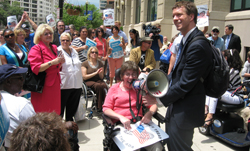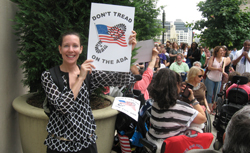 As America celebrates the 22nd anniversary of the Americans with Disabilities Act (ADA), a coalition of the largest disability rights groups in the country – representing over 54 million Americans – announced a robust, national boycott targeting top hotels lobbying to roll back the ADA.
As America celebrates the 22nd anniversary of the Americans with Disabilities Act (ADA), a coalition of the largest disability rights groups in the country – representing over 54 million Americans – announced a robust, national boycott targeting top hotels lobbying to roll back the ADA.
As America prepares to celebrate the 22nd anniversary of the Americans withDisabilities Act (ADA), a coalition of the largest disability rights groups in the country – representingover 54 million Americans – today announced a robust, national boycott and public awarenesscampaign this morning on a conference call with reporters. The two-part campaign calls for both aboycott of the hotels represented by the executive officers of the industry’s two, leading lobbyingassociations – responsible for a self-described “intensive campaign” to stop enforcement of the ADA’spool regulations – as well as a community-wide grassroots mobilization and public awarenesscampaign, until the industry publicly ceases all efforts to chip-away at “equal access” protections embodied in the ADA.
A coalition of disability rights groups – including the American Association of People withDisabilities, National Disability Rights Network, ADAPT, National Council on Independent Living, and over 50 local and state disability rights groups and service providers – are leading the campaign’sefforts. The boycott and public awareness campaign, the largest and most significant action by thedisability rights community in recent history, was featured this morning in an exclusive story in USAToday, the newspaper of choice for America’s hotels.
and state disability rights groups and service providers – are leading the campaign’sefforts. The boycott and public awareness campaign, the largest and most significant action by thedisability rights community in recent history, was featured this morning in an exclusive story in USAToday, the newspaper of choice for America’s hotels.
The hotels and hotel chains represented on the board of the American Hotel & Lodging Association (AH&LA) and the Asian American Hotel Owners Association (AAHOA) will be the target of the first phase of the campaign, launched today. More widespread hotel boycotts will be launchedbeginning on July 26, which is the 22nd anniversary of the signing of the Americans with Disabilities Act – a signature civil rights bill.
Hotels and hotel chains represented on the board of AH&LA and AAHOA include Kimpton and Radisson, as well as many other national hotel chains and several smaller, independent hotels. Next week, the boycott will escalate to a much broader range of hotels and hotel chains, which will beaccompanied by an online public awareness campaign about the role of the hotel industry in blockingequal access for Americans with disabilities and a grassroots organizing effort to document online anddraw attention offline to hotels across the country that are not in compliance with ADA regulations.
“Americans with disabilities are fighting each day to hold on to the very services that keep us inour homes and living independently, which is why this latest move by AH&LA and AAHOA is sodisappointing,” said Kelly Buckland, executive director of the National Council on Independent Living. “We didn't think when the ADA was passed back in 1990 that we would have to protect it each day of our lives – but it's clear that these lobbying groups are intent on placing profits above people, so fight through the summer. We fought hard for the ADA, and there's no way in hell that we'll let it be takenaway from us without a very public fight.”
“These industry groups are fighting tooth and nail to prevent Americans with disabilities fromgaining access to their pools," said Mark Perriello, president and CEO of the American Association of People with Disabilities (AAPD). “Twenty-two years after the passage of the Americans withDisabilities Act, it's disappointing to see the so-called 'hospitality industry' fight so hard to prevent itsimplementation. Now the disability community is fighting back.”
The hotels and hotel chains targeted in this boycott were selected because the executiveofficers within these two lobbying groups are the ones who have the power to stop AH&LA and AAHOA from continuing their harmful efforts to whittle down the Americans with Disabilities Act and totreat Americans with disabilities unfairly.
“It is fundamentally unfair to expect people with disabilities to pay for an amenity that theycannot access,” said Curt Decker, executive director of the National Disability Rights Network, thenation's largest provider of legal services to people with disabilities. “Hotel owners and operatorsacross the country should be ashamed of the groups representing their interests in Washington at theexpense of paying customers across the country.”
“I am the Chair of a meeting that takes place three times a year and brings some of the topdisability rights leaders in the United States together for a two-day meeting,” said Colleen KellyStarkloff, co-director of the Starkloff Disability Institute. “The issue of compliance with the ADAregarding lifts on pools in hotels and motels has become an important issue in the disabilitycommunity and has now become an important consideration in my choice of where this group willmeet. When I relayed my desire to find a hotel with a permanent pool lift for people with disabilities,one hotel in St. Louis responded quickly that they are planning on installing one by the compliancedate of January, 2013. They want our business! This is good for business.”
According to a Harris Poll conducted in conjunction with Open Doors Organization and theTravel Industry of America, "the 50 million people with disabilities in our country have a combinedincome of more than $1.75 billion. In 2002, this community took 32 million trips and spent more than$13.6 billion on travel ($4.2 billion on hotels, $3.3 billion on airfare, $2.7 billion on food and beverage,and $3.4 billion on retail, transportation, and other activities)." In fact, the study suggests that, "thesetravelers would double their spending if some minor amenities were made available. Meet and greetprograms at airports, preferred seating on airplanes, hotel rooms closer to amenities, and employeeswho go out of their way to accommodate guests with disabilities topped the list.”